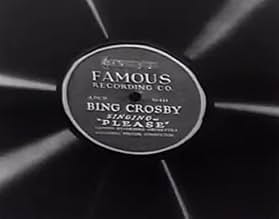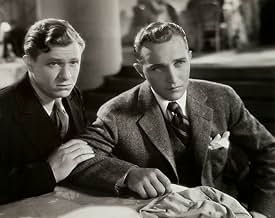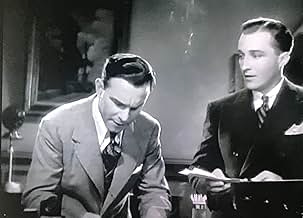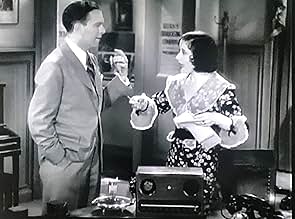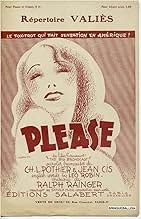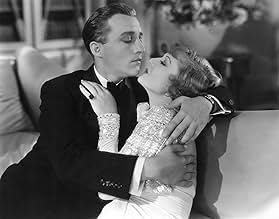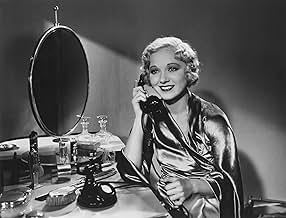Agrega una trama en tu idiomaA radio-singer, Bing Crosby, is none-too-concerned about his job, and an affair with Mona leads to his dismissal. When it appears Hornsby is getting and paying a lot of attention to his fian... Leer todoA radio-singer, Bing Crosby, is none-too-concerned about his job, and an affair with Mona leads to his dismissal. When it appears Hornsby is getting and paying a lot of attention to his fiancée, Anita Rogers, station manager Leslie McWhinney buys the station, gives Hornsby his jo... Leer todoA radio-singer, Bing Crosby, is none-too-concerned about his job, and an affair with Mona leads to his dismissal. When it appears Hornsby is getting and paying a lot of attention to his fiancée, Anita Rogers, station manager Leslie McWhinney buys the station, gives Hornsby his job back, and goes on a honeymoon with Anita.
- Dirección
- Guionistas
- Elenco
- Premios
- 1 premio ganado en total
- George
- (as Burns and Allen)
- Gracie
- (as Burns and Allen)
- Dirección
- Guionistas
- Todo el elenco y el equipo
- Producción, taquilla y más en IMDbPro
Opiniones destacadas
I give you three choices: 1) Watch the whole movie, to experience the drama, along with the actual 'big broadcast'. 2) Watch only the film beginning with the 60min mar, to delete most of the drama. 3)watch the YouTube 'the Big Broadcast 1932 excepts': a 12 min. Extraction of what are considered the most entertaining musical numbers of the actual 'big broadcast'. The musical performances during the actual 'big broadcast' include the following: 1) the Mills Brothers sing "Tiger Rag" I don't know how the one manages to make a very good imitation of a musical instrument with just his hands together. 2)The Vincent Lopez orchestra does a rather amusing novelty number 3)Vincent Novis sings the inspirational song "Trees" (Only God can make a tree) 4) The 3 Boswell sisters sing the jazzy "Crazy People" 5 )Kate Smith sings an inspirational number 6 )Cab Calloway dances around while singing "Minnie the Moocher", backed up by his band. Lastly, Stuart tries to mimic Bing, who is late, in singing "Please". Eventually, Bing shows up, and sings the last part. You also get a brief look at the luscious Leila, if you haven't already,. Mona is also present, with an unexplained black eye(she was last seen in Bing's company).
If you aren't familiar with the 3 Boswell Sisters, they grew up in New Orleans during the birth of jazz there, which influenced much of their music. They were very popular on radio, as well as records from mid '20s to mid '30s, encompassing the late 'jazz Age' and early 'Swing Era'. The Andrew sisters took over their spot in the late '30s and 40s, during the height of the 'Swing Era' and WWII. Hence, they tend to be more remembered, although they learned much from the Boswell Sisters. The McGuire Sisters then largely replaced the Andrew Sisters in the'50s, I tend to remember the McGuire Sisters the least of these 3. There are several songs by the Boswell Sisters at YouTube, or you can buy one of the several CDs of their music currently available.
"The Big Broadcast" has Bing (also his character's name) more preoccupied with his fiancee Mona Lowe (Sharon Lynn) than his radio show when he shows up late for his broadcasts. The manager, George Burns (yes, the comedian), is on the verge of losing his radio station to bankruptcy. The movie's premise parallels Bing's early radio career when he didn't appear for the first couple of days to his premier '15 Minutes with Bing Crosby.' CBS had heavily promoted the singer's August 31, 1931 debut, but after rehearsing in a frigid air-conditioned studio earlier that day, his failure to come to the station that evening and on the following night led to rumors he was either too drunk or too nervous to sing. In reality, Crosby came down with a case of laryngitis.
"The Big Broadcast" was also George Burns' and his wife Gracie Allen's first feature film. Orphaned at a young age, Burns teamed up with three other kids to form the "Pee-Wee Quartet." Later in vaudeville, he was paired with females as a sounding board for his comic, singing and dancing routines. After one brief marriage, he partnered with Gracie Allen in 1923 and married her three years later. Burns recalled, "And all of a sudden the audience realized I had a talent. They were right. I did have a talent-and I was married to her for 38 years." At first Gracie said all the serious lines while George was the comic. As time passed, Burns discovered her quips were getting more laughs than his supposed funny jokes, so they switched deliveries. Gracie is the station manager's secretary in their debut film. The couple went on to become highly popular on the screen, in radio and on television.
"The Big Broadcast's" showcased several popular radio personalities as the station's new owner, Texas oilman Leslie McWhinney (Stuart Erwin), organized a single-night singing extravaganza to raise money. Cab Calloway, The Mills Brothers, Eddie Lang and Kate Smith are shown performing in front of the mic. Crosby himself sang three songs , including his hit 'Where the Blue of the Night Meets the Gold of the Day,' nominated by the American Film Institute as one of 400 tunes for the top 100 Songs in American Movies. The film was such a box office hit it spawned three additional feature films, "The Big Broadcast of 1936," "1937" and "1938." Newspaper reviews were generally very positive about Crosby's future in the entertainment world. Wrote the film critic for The New York American, "Bing Crosby is the star, make no mistake about it. He has a camera face and a camera presence. Always at ease, he troupes like a veteran." The reviewer must have had great intuition because Crosby went on to make over 70 feature films in his lifetime.
The slight plot revolves around Bing Crosby (Bing Crosby), the most popular singer at WADX Radio Station in New York City. Due to his constant lateness, Mr. Clapsaddle (George Barbier), the upset sponsor, forces radio manager, George Burns (George N. Burns) to have Crosby fired. Anita Rodgers (Leila Hyams), Burns' secretary, silently loves Bing, though he fails to notice her. Bing is engaged to marry dancer, Mona Lowe (Sharon Lynn), the one responsible for his irresponsible behavior. While celebrating his final days as a bachelor with his friends at a speakeasy, Bing sees a newspaper article of Mona eloping with a broker and jilting Crosby. After befriending an equally depressed Leslie McWhinney (Stuart Erwin), a Texas oil man jilted by the girl he loves and being taken for $100,000 by a gold-digging widow, Bing invites the poor soul to his apartment where he plans a double suicide. Bing's plot fails with the arrival of Anita, Leslie's girlfriend from back home, with the news of Mr. Burns agreeing to give Bing his job back now that he's no longer engaged to be married. As Bing arranges to find Leslie a job at the studio, warrant officers turn up to close down the station. With his remaining $900,000, Leslie buys the radio station and becomes its president. All goes well until Mona Lowe returns to Bing life again, making him irresponsible once more. Here lies love.
With old and new tunes (by Leo Robin and Ralph Rainger) combined for THE BIG BROADCAST, the musical program features that of "Dinah" (sung by Bing Crosby); "Speakeasy" (sung by telephone operators, Major, Sharp and Minor); "Here Lies Love" (sung by Arthur Tracy); "Here Lies Love" (reprised by Crosby); "Please" (Crosby); "Tiger Rag" (sung by the Four Mills Brothers); "Please" (reprise by Crosby); "I'm the Drummer" (sung by Vincent Lopez); "Trees" (sung by Donald Novis); "Crazy People" (sung by The Boswell Sisters); "It Was So Beautiful" (sung by Kate Smith); "Kicking the Gong Around" (sung by Cab Calloway); and "Please" (finale). At one point in history, a motion picture soundtrack of THE BIG BROADCAST was available through Sandy Hook records in the 1980s, but the movie itself thus far has never been distributed to home video.
The comedy team of George Burns (radio manager) and Gracie Allen (the receptionist) incorporate their vaudeville routines as part of the plot on two separate occasions rather than during the on-screen radio broadcast. The movie also acquires the brief glimpses of actual radio announcers (James Wallington, Donald Ball, William Brenton and Norman Brokenshire) introducing the upcoming acts. Paramount pulls no stops on broad comedy, whether cartoonish, the use of high speed projection, laughing toy horses or even allowing material reminiscent to those silent comedy era through situations enacted through radio theme music but no inter-titles as the hapless Leslie tries in vain to acquire a Bing Crosby record and prevent himself from either losing or damaging it.
Commonly presented on broadcast television in the 1970s and public television a decade later, the only known cable TV showing in latter years for THE BIG BROADCAST happened to be from American Movie Classics (1990-91). Due to its enormous popularity and career launching of Bing Crosby, Paramount repeated its success with follow-up sequels in name only: THE BIG BROADCAST OF 1936 (1935), 1937 (1936) and 1938 (1938), with the 1938 edition being notable for the feature film introduction of Bob Hope, Crosby's on-screen partner in seven installments to "The Road to" comedy series from 1940-1962. Regardless of surreal plot and situations, THE BIG BROADCAST is nostalgic in its own little way, and should still be of entertaining value even today. One final note: Why do many references refer to Crosby's role as Bing Hornsby? He's addressed and billed as Bing Crosby throughout the entire story. And now, The Big Broadcast. (**1/2)
¿Sabías que…?
- TriviaBing Crosby's song "Please" became the inspiration for John Lennon to write the Beatles' first hit "Please, Please Me"
- Citas
Anita Rogers: I love somebody else.
Leslie McWhinney: Whoever he is, he's a fool if he can't see you.
Anita Rogers: [after a long pause] It's Bing.
Leslie McWhinney: Bing?
- Créditos curiososFilm opens with loudspeakers, then segues to lobby cards depicting several of the featured stars "Live".
- ConexionesEdited into The Great Radio Comedians (1972)
- Bandas sonorasMinnie the Moocher
Written by Clarence Gaskill, Cab Calloway and Irving Mills
Performed by Cab Calloway
Selecciones populares
Detalles
- Fecha de lanzamiento
- País de origen
- Idioma
- También se conoce como
- The Crooners
- Locaciones de filmación
- Productora
- Ver más créditos de la compañía en IMDbPro
- Tiempo de ejecución
- 1h 28min(88 min)
- Color
- Relación de aspecto
- 1.37 : 1

